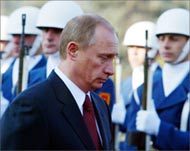Turkmenistan polls seen as ‘farce’
Turkmenistan’s forthcoming parliamentary elections are being dismissed as a farce by Western diplomats.

President Saparmurat Niyazov’s authoritarian leadership appears more and more divorced from the outside world, they say.
Election officials in the natural gas-rich former Soviet republic have insisted that Sunday’s elections to the 50-seat parliament, or majlis, will be competitive.
But only one political party, Niyazov’s Democratic Party, is registered.
“To be nominated for parliament a person must be an honest, decent citizen demonstrating loyalty to the country, homeland and president and adhering to high professional, political and legal standards,” election commission chairman Murad Karryev said.
No observers
The poll is the latest in Turkmenistan to which no international observers have been invited, including from the Organisation for Security and Cooperation in Europe (OSCE) or from Russia – usually a cheerleader for elections in former Soviet states.
 |
|
Russia continues to wield strong |
Niyazov, 64, was the Central Asian country’s last Soviet leader and has retained power ever since, building a personality cult around himself and his deceased parents and declaring himself president-for-life and Turkmenbashi (father-of-all-Turkmen) in 1999.
The president’s supporters say he successfully oversaw Turkmenistan’s journey to independence, and has had considerable success in economically stablilising the country and allieviating poverty.
However, Niyazov has repeatedly been criticised by the West, particularly since an alleged coup attempt in 2002 led to the arrest of hundreds of people, including children and old people, and to some suspects being tortured, drugged and possibly killed, according to the US State Department.
Since last year’s publication of a highly critical OSCE report on those events, “the situation in Turkmenistan sadly has not improved significantly”, Larry Napper, a senior US diplomat, told an OSCE meeting in October.
Toothless institution
The majlis was already a toothless institution before Niyazov launched a partly-appointed higher legislative body last year, the People’s Council, which meets annually.
Differing publicly with Niyazov has become extra-hazardous since a law passed last year made it a crime punishable by life imprisonment to “sow doubt about presidential policy”.
|
“The changing of parliamentarians will have no effect on political life as parliament is completely subordinate to the president and has no real authority” a Western diplomat |
In an echo of Soviet times, 63-year-old community leader Gurbandurdy Durdykuliyev was forcibly detained in a remote psychiatric hospital in February after applying for permission to organise a protest on Niyazov’s birthday, according to Amnesty International.
Despite an assurance by the election commission that all is ready to ensure a high turnout on Sunday, there seems little public awareness of the election in the capital Ashgabat, a city dominated by a golden statue of Niyazov that rotates with the sun’s passage across the sky.
“I didn’t know there were elections – I haven’t seen any signs about it,” said Durdy, a 19-year-old just out of army service and looking for work.
Strategic location
“I haven’t heard anything about elections – I spend all my time trading in the bazaar,” said another resident, Ailar, 40.
“The changing of parliamentarians will have no effect on political life as parliament is completely subordinate to the president and has no real authority,” a Western diplomat said.
|
“I didn’t know there were elections – I haven’t seen any signs about it” |
Turkmenistan will continue to be watched though, both by Moscow, which needs Turkmenistan’s vast natural gas reserves to help meet European demand, and by Washington, whose efforts to court Niyazov have had only limited success.
However, whenever Niyazov departs, the outlook may not be good for this desert country wedged between Afghanistan, Iran and Uzbekistan.
“Any succession is likely to provoke tension, with a high possibility that it could descend into chaos and possibly political violence,” the International Crisis Group, a security thinktank, said recently.
Eligible voters are thought to number around a third of the population, which is variously estimated at between five million and 6.5 million.